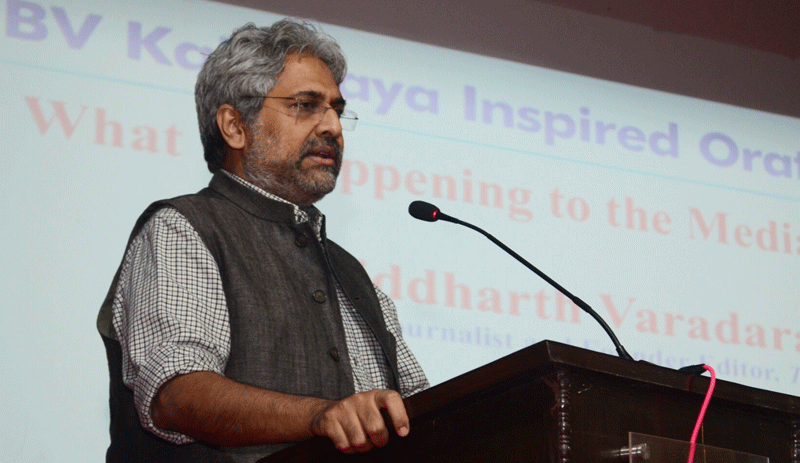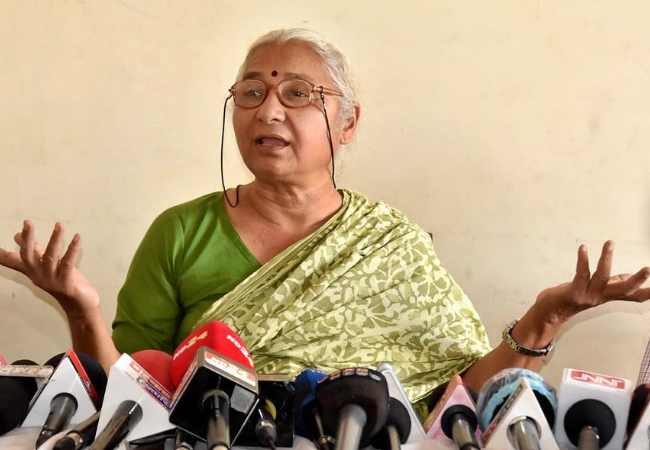New Delhi: About 3,500 jurists, academics, actors, artistes, writers and people from other walks of life have slammed the Uttar Pradesh government and police for filing an FIR against Siddharth Varadarajan, the founding editor of web portal The Wire, and demanded that all criminal proceedings against him be dropped.
In a joint statement on Tuesday, they called the registration of the FIR against Varadarajan an attack on press freedom. They also urged the central and state governments not to use the COVID-19 pandemic as a cover to trample upon the media's freedom. A medical emergency should not serve as a pretext for imposition of a de facto political emergency, the statement said.
The signatories to it include former Supreme Court judge Madan B Lokur, former Madras High Court judge K Chandru and former Patna High Court judge Anjana Prakash.
Two former chiefs of naval staff -- Admiral Ramdas and Admiral Vishnu Bhagwat -- are also among the signatories, along with former finance minister Yashwant Sinha.
The statement expressed shock at the action of the Uttar Pradesh government under Chief Minister Adityanath and police in filing criminal charges against The Wire and one of its founding editors for an "entirely factual story on COVID-19 and religious events".
"This attack on media freedom, especially during the COVID-19 crisis, endangers not just free speech, but the public's right to information," the statement said.
The signatories called upon the Uttar Pradesh government to withdraw the FIR against Varadarajan and The Wire, and drop all criminal proceedings. They also called upon the media not to communalise the pandemic.
The Uttar Pradesh police booked Varadarajan this month over comments on Twitter, claiming that the day the Tablighi Jamaat event was held in Delhi, Adityanath had insisted that a Ram Navami fair will take place as usual.
The FIR against the journalist also mentioned his remark questioning Adityanath's participation in a religious ceremony at the Ramjanmabhoomi site in Ayodhya during the nationwide lockdown to contain the spread of coronavirus.
The statement said the target of this action was a factual story on the Tablighi Jamaat and its exposure to COVID-19.
"Towards the end, the impugned article merely pointed out that 'Indian believers' more generally have been late to adopt precautions and avoid congregation, recalling UP Chief Minister Adityanath's plans, as late as March 18, to proceed with a religious fair at Ayodhya and his flouting of the national lockdown and social distancing norms by taking part in a religious ceremony along with others on March 25," the statement said.
Two FIRs were filed under various provisions of law on April 1, one on a complaint from a resident of Ayodhya and the other on the basis of a complaint by the Station House Officer (SHO) of Faizabad's Kotwali Nagar Police station, it noted.
A plain reading of the sections invoked in the FIRs made it clear that they could not possibly apply to the article in question, the statement said.
"The FIRs were followed up with a gross display of intimidation on April 10, when policemen arrived in a black SUV with no number plate at Varadarajan's residence in Delhi to issue a legal notice, ordering him to appear in Ayodhya on April 14 at 10 am," it said.
That the Uttar Pradesh government sent policemen who drove 700 kilometres during the nationwide lockdown to issue this summons, when the postal system was still operational, spoke volumes for its priorities, the statement added.
"The UP police's action is just the latest in a series of attempts by the ruling establishment, or persons close to them, to entangle The Wire and its editors in legal cases in an effort to shut them down," it said.
The police action against The Wire also came against the backdrop of the "demonisation of Muslims" in a section of the media as being responsible for the spread of the novel coronavirus in India, the statement said.
Several former bureaucrats, including former national security adviser Shivshankar Menon, former foreign secretary Sujatha Singh, former adviser to the governor of Punjab and former ambassador to Romania Julio Ribeiro and former CEC MS Gill, among others, are signatories to the statement.
Other signatories include authors Vikram Seth, Nayantara Sahgal, Arundhati Roy, Anita Desai, K Satchidanandan and Kiran Desai.
The statement has also been endorsed by actors and artistes such as Amol Palekar, Naseeruddin Shah, Nandita Das, Farhan Akhtar and Mallika Sarabhai. Zoya Akhtar, Kiran Rao and Anand Patwardhan are among the filmmakers, and Dayanita Singh is among the photographers who have backed the statement.
Senior journalists and over a thousand professors from universities across the globe are also among the signatories.
The FIR against Varadarajan had referred to a tweet by him, which said, "On the day the Tablighi Jamaat event was held, Adityanath insisted a large Ram Navami fair planned for Ayodhya from March 25 to April 2 would proceed as usual and that Lord Ram would protect devotees from the coronavirus."
Later, the journalist tweeted, saying, "I should clarify that it was Acharya Paramhans, Hindutva stalwart and head of the official Ayodhya temple trust, who said Ram would protect devotees from coronavirus, and not Adityanath, though he allowed a public event on 25/3 in defiance of the lockdown and took part himself.
Let the Truth be known. If you read VB and like VB, please be a VB Supporter and Help us deliver the Truth to one and all.
New Delhi (PTI): A court here on Saturday acquitted social activist Medha Patkar in a criminal defamation case filed by Delhi L-G V K Saxena, saying the prosecution failed to prove that she made the alleged defamatory statements during a television programme in 2006.
The complaint was filed by Saxena, then president of the National Council for Civil Liberties, alleging that Patkar had defamed him during a TV programme.
Judicial Magistrate First Class Raghav Sharma, while hearing the case, said the complainant had failed to produce legally admissible evidence to establish that Patkar had made the impugned statements.
According to the complaint, Patkar had allegedly claimed during the programme that Saxena and his NGO had received civil contracts connected with the Sardar Sarovar project, an allegation Saxena denied and termed defamatory.
The court said the material on record showed that Patkar was not a panellist on the programme and that only a short pre-recorded video clip of her was played during the telecast.
"It is important to note that neither the reporter who actually recorded the audio-video nor any person who had seen the accused making the impugned statements has been examined as a witness.
"It is also crucial to note that the clip played in the programme/show appears to be only a very short clipping from an interview or press conference of the accused," the judge said.
The court noted that to establish anything in the case, it is essential to produce the entire video and audio of the press conference before the court about the alleged defamatory remarks given by the accused.
"Without examining the entire clip or footage of that interview, no determination can be made regarding the speech of the accused," the judge said.
The court said that Saxena failed to place on record the original video footage or the recording device that allegedly captured the defamatory remarks, and as a result, the statements attributed to Patkar could not be established.
"The only document capable of proving that the accused made the impugned statements would be the original electronic device in which such statements were recorded," the court said, adding that neither the device nor a valid secondary copy was placed on record.
The case was filed before a court in Ahmedabad. It was transferred to Delhi in 2010 on the orders of the Supreme Court.
In the absence of legally admissible evidence proving publication of defamatory statements by Patkar, the court acquitted her of the charge under IPC Section 500 (defamation).
In August 2025, in a separate defamation case filed by VK Saxena, the Supreme Court confirmed Patkar's conviction ordered by the trial court and set aside a penalty of Rs 1 lakh imposed on her in the case.



_vb_37.jpeg)
_vb_52.jpeg)
_vb_76.jpeg)